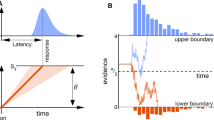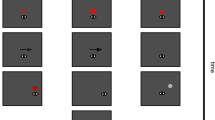Abstract.
Reward is a primary goal of behavior and is crucial for survival of animals. To explore the mechanisms underlying such reward-oriented behavior, we devised a memory-guided saccade task in which only one fixed direction out of four was rewarded, which was called the one-direction-rewarded task (1DR). As the rewarded direction was changed in four blocks, saccades in a given direction were rewarded in one block (constituting reward-oriented behavior), but non-rewarded in the other blocks (non-reward-oriented behavior). As a control, an all-directions-rewarded task (ADR) was used. Using these tasks, we found that the parameters of saccades changed depending on whether or not the saccade was followed by reward. (1) The mean saccadic peak velocity was higher and the mean saccade latency was shorter in the rewarded condition than in the non-rewarded condition. (2) The mean saccade amplitude showed no difference in two out of three monkeys. (3) The variations of saccadic velocity, latency and amplitude were smaller in the rewarded condition. (4) Within a block of 1DR, the saccade velocity remained high in the rewarded condition, but decreased gradually in the non-rewarded condition; it decreased only slightly in ADR. The saccade latency showed the opposite pattern of change, but less clearly. (5) The saccades in the non-rewarded condition tended to have slower velocities and longer latencies in the trials shortly after a rewarded trial. (6) The ratio of error trials was much higher in the non-rewarded condition than the rewarded condition. (7) The errors, which were due to premature or incorrect saccades, showed unique spatiotemporal patterns that would reflect the competition between the cognitive and motivational processes. These results provide important constraints to the neuronal mechanism underlying reward-oriented behavior because it must satisfy these rules.
Similar content being viewed by others
Author information
Authors and Affiliations
Additional information
Electronic Publication
Rights and permissions
About this article
Cite this article
Takikawa, Y., Kawagoe, R., Itoh, H. et al. Modulation of saccadic eye movements by predicted reward outcome. Exp Brain Res 142, 284–291 (2002). https://doi.org/10.1007/s00221-001-0928-1
Received:
Accepted:
Issue Date:
DOI: https://doi.org/10.1007/s00221-001-0928-1




